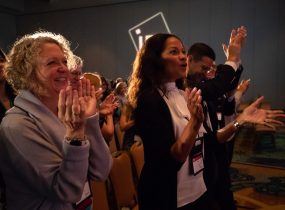Knowledge Center
Economic Development
A primary objective for place managers is fostering a healthy, sustainable, diverse and prosperous economy for the managed place. The place manager collaborates and works closely with various levels of local and regional economic development organizations, developers, real estate brokers, private firms, philanthropic foundations, destination management organizations, non-profits, and state and federal government agencies, while representing the specific and unique needs, challenges and trends of the managed place.
Additionally, the place manager will work to recruit and retain businesses, conduct market research, encourage a strong local workforce, maintain a diverse mix of commercial and residential development, and facilitate a built environment that is accessible for all users to live, work, play, visit and invest.
Top Issues Council: Living Downtown – The New Residential Paradigm
This paper explores the importance of downtown residential activity, reviews efforts to attract housing development into downtowns and discusses many of the elements of accommodating downtown residents once they are there.
Read MoreChanging Face of Economic Development: Land Use, Sustainability, and Housing
The nature of retail is changing in the digital age, and so are its consumers. This presentation walks through what changes are occurring and what to expect in the future, as well as how to help retailers adapt and succeed.
We’d love for you to see this member-only resource to help make a difference in your district. Make sure you are logged in or join IDA to learn more about how members get sh*t done!
Improvement and Benefit for Who? The Hows, Whys, and What to Dos About Gentrification
Community improvements made by a variety of stakeholders often disproportionately benefit property owners who do not contribute their fair share. In many instances property owners become millionaires on the back of the work and investment of others. This presentation walks through a scenario where a property owner with a property assessed at $650 thousand is selling for $3.2 million, breaking down the community improvements that have lifted the property’s sale value.
We’d love for you to see this member-only resource to help make a difference in your district. Make sure you are logged in or join IDA to learn more about how members get sh*t done!
Internet VS IRL, and the Power of FOMO
Events can be a significant and reliable strategy for attracting people to downtown. The panelists share their strategies and marketing tactics to put on successful events.
We’d love for you to see this member-only resource to help make a difference in your district. Make sure you are logged in or join IDA to learn more about how members get sh*t done!
Miami – Value of Downtowns Pilot Study
The Senior Manager of Urban Ecnomics & Market Development for the Miami Downtown Development Authority, Nicholas Martinez, AICP shares the results of IDA’s Value of Downtown study for downtown Miami.
We’d love for you to see this member-only resource to help make a difference in your district. Make sure you are logged in or join IDA to learn more about how members get sh*t done!
The Current Narrative on the Retail Industry
In the age of Amazon and the explosive growth of online retail the rumors of the death of brick and mortar have been greatly exaggerated. Mike Bern, Principal at MJB Consulting, walks through the numbers around today’s retail industry and shares his insights on what will help downtown retail remain competitive and relevant against online retail.
We’d love for you to see this member-only resource to help make a difference in your district. Make sure you are logged in or join IDA to learn more about how members get sh*t done!
City of Tulsa Advisory Panel: How to Bring Bustle to Downtown
IDA’s Advisory Panels are a time-tested way to explore new ideas, solve difficult problems, and rally the board, staff and community around priority projects or topics. This panel was asked to assess the downtown’s on-the-street activity, street level offerings, and the governance and partnerships managing the downtown area. The report details the panel’s findings and recommendations.
Read MoreColorado Springs ULI/IDA Advisory Panel: Affecting a Downtown Reniassance
IDA’s Advisory Panels are a time-tested way to explore new ideas, solve difficult problems, and rally the board, staff and community around priority projects or topics. This panel was tasked with creating a strategy for a downtown renaissance. The panel highlighted assets to leverage, identified challenges, and identified specific opportunities to execute high-payoff actions to focus time and funding on. The presentation details the panel’s findings and recommendations.
Read MorePittsburgh Downtown Partnership Advisory Panel: Strategy for Housing Growth
IDA’s Advisory Panels are a time-tested way to explore new ideas, solve difficult problems, and rally the board, staff and community around priority projects or topics. This panel was asked to identify the challenges and obstacles for building new housing in downtown, as well as identify resources and tools available for creating new housing. The report details the panel’s findings and recommendations.
Read MoreWheaton Central Business District Advisory Panel: How to Leverage County Assets in Downtown
IDA’s Advisory Panels are a time-tested way to explore new ideas, solve difficult problems, and rally the board, staff and community around priority projects or topics. This panel weighed in on how to best use county land assets and strategically locate and leverage valuable amenities in downtown to spur growth. The report details the panel’s findings and recommendations.
Read More


